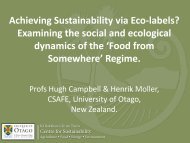Book of Abstract (incl. addendum) - IFSA symposium 2012
Book of Abstract (incl. addendum) - IFSA symposium 2012
Book of Abstract (incl. addendum) - IFSA symposium 2012
Create successful ePaper yourself
Turn your PDF publications into a flip-book with our unique Google optimized e-Paper software.
Workshop 2.3 Systems thinking and practice in rural innovation: advances in concept,<br />
methodologies and interventions<br />
system should address an evolutionary process <strong>of</strong> capacity development which synchronizes required<br />
changes in the roles <strong>of</strong> individuals and organizations within a project context.<br />
Structural conditions for dynamic innovation networks: a review <strong>of</strong> eight<br />
European Agricultural Knowledge and Innovation Systems<br />
Frans Hermans, Laurens Klerkx and Dirk Roep<br />
Wageningen University, The Netherlands<br />
Frans.Hermans@wur.nl<br />
The relationship between collective stakeholder actions, social learning and rural innovation has<br />
become one <strong>of</strong> the pillars to work on radical transitions towards a more sustainable agricultural sector.<br />
It has become more and more recognized that many innovations are the result <strong>of</strong> intersectoral<br />
collaborations within flexible and dynamic innovation networks. In these networks, joint (or social)<br />
learning and negotiation takes place between different types <strong>of</strong> actors in processes <strong>of</strong> knowledge cocreation.<br />
However creating and fostering effective linkages among heterogeneous sets <strong>of</strong> actors is far from<br />
easy and is <strong>of</strong>ten hindered by different technological, social, economic and cultural divides. Such<br />
divides may be caused, for example, by different incentive systems for public and private actors,<br />
differences between local indigenous knowledge systems and formal scientific knowledge systems,<br />
social and cultural differences that cause exclusion <strong>of</strong> certain actors and ideological differences.<br />
In this paper we investigate the organisation and functioning <strong>of</strong> the formal AKS and how it can support<br />
or inhibit innovative bottom-up approaches to knowledge co-creation and social/joint learning.<br />
The paper will present a comparative analysis <strong>of</strong> the different types <strong>of</strong> arrangements <strong>of</strong> the<br />
Agricultural Knowledge Systems within eight different European countries (England, France,<br />
Germany, Hungary, Italy, Latvia, the Netherlands and Switzerland). We have investigated how the<br />
main actors interact within their respective innovation systems and how they are influenced by various<br />
institutional characteristics. Using an Innovation System Performance (ISP) matrix (Klein Woolthuis et<br />
al., 2005; van Mierlo et al., 2010) the main enablers and barriers with regard to collective action have<br />
been categorized.<br />
Results thus show how these institutional determinants can both support or inhibit joint learning<br />
and bottom-up innovation projects.<br />
Assessing the impact <strong>of</strong> uncertainty in automatic milking innovation systems<br />
- an international perspective<br />
Callum Eastwood and Sean Kenny<br />
University <strong>of</strong> Melbourne, Australia<br />
Callumre@unimelb.edu.au<br />
The use <strong>of</strong> automatic milking systems (AMS) is in an emergent phase in Australia with approximately<br />
15 farms using the system in 2011. Dairy Australia, an industry-good research and development<br />
organisation, has acknowledged a future role for this technology in the Australian dairy industry.<br />
However, successful uptake <strong>of</strong> automatic milking relies on farming system adaptation and existence <strong>of</strong><br />
appropriate technological, social, and institutional system configuration.<br />
An online survey <strong>of</strong> 85 AMS researchers and service providers was conducted internationally,<br />
followed by case studies <strong>of</strong> non-farmer experts in selected AMS markets (The Netherlands, Denmark,<br />
England, Ireland). Results from the online survey were used to form a basis for the semi-structured<br />
interview questions in the case studies. An innovation systems framework was used to analyse the<br />
results, with particular attention to the mediation <strong>of</strong> technological learning through structures and<br />
initiatives which reduce uncertainty associated with the innovation.<br />
46











